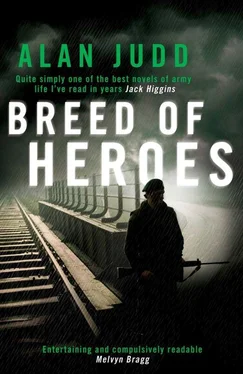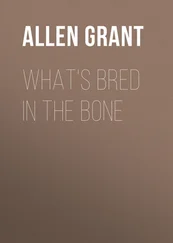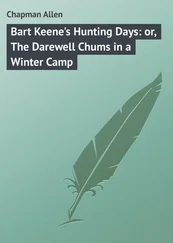The part of Belfast they were going to was one of the most notorious in the city. It was in the south-west and had a population that was eighty per cent Catholic and twenty per cent Protestant. The Catholics lived in IRA-dominated ghettos and the Protestants in a tight little enclave in one corner of the battalion area. The two communities were divided by the Peace Line — a tortuous, tangled line of wire, corrugated iron, concrete and sentry-boxes that had to be manned day and night. During the 1969 riots the Protestants had burned down a score of Catholic houses. There had been attempts by the residents to build new ones, mostly without planning permission and sometimes without planning. The Catholic part of the area had been prominent during the recent riots. According to Nigel there were two IRA ‘battalions’ in the area and both had been ordered to step up their activities during the next few weeks. This could provoke a Protestant reaction. The CO, however, took it as a compliment to the battalion to be given such a welcome by the enemy and he was sure that the harder it was the more his soldiers would like it.
Battalion HQ was to be in a police station, while the companies occupied schools, factories, houses and a disused bus garage. C company was the largest and had what the CO considered the most interesting area. It included a part of the Peace Line, a few Prot streets and a large Catholic estate of ill-repute where several soldiers had already died that year. Company HQ was a bottling factory. Charles did not need to see it to know that it was a move for the worse. The barracks in Killagh were almost academic cloisters by comparison. The Factory was a nineteenth-century building of six storeys set in the midst of a maze of narrow, mean streets and enclosed by a high wall. The iron gate was kept closed and there were two knife-rests in the street outside, which forced traffic to weave past slowly, at walking-pace. Inside and outside the wall the ground was littered with glass and rubble. The outgoing unit’s Land-Rovers were battered, dented and holed.
Charles was greeted on arrival by the CSM, a popular, gravel-voiced Liverpudlian whose face was almost as battered as the Land-Rovers. ‘’Tain’t much, sir, but it’s ’ome. Only four more months. Won’t be so bad when we’ve cleaned it up a bit. Soon as this bloody lot clear off we can get started. Live like pigs, don’t they? Must’ve caught it from the people round ’ere, by what I’ve seen of ’em.’ He laid his hand confidentially on Charles’s arm and indicated the broken bricks, bits of piping, paving stone and glass that lay scattered about the parked vehicles. ‘See all this shit, sir? D’you know ’ow it got here? Kids threw it, little kids last night. ’Undreds of ’em in the street outside, lobbing it over the wall. I come down with the advance party, see, just in time to cop the lot of it. Like a bleedin’ avalanche, it was. And the same thing happens every time one of their Land-Rovers pokes its nose out the gate, which is why they’re all in shit order. So I says to the guard commander, like, well, what you going to do about it, ain’t you going to stop ’em? Oh no, ’e says, it ’appens every night, it’s nothing serious, we just let ’em get on with it. Containment, he called it. Containment, I ask you! Standing there letting a mob of kids chuck bricks at you. I says to ’im, I says, well, this is the last night they do it, you can tell ’em that from me, ’cos when we take over tomorrow night containment stops and ear-boxing starts. I’ll give ’em bloody containment.’
Charles struggled with his unnecessary quantity of kit up the stone stairs into the Factory. There was a continuous sound of activated machinery, punctuated every few seconds by a crash that shook the building.
‘The bottling,’ said the CSM. ‘That’s what that is. They still use the first two floors, you see. Six in the morning till ten at night. They’re all Prot workers but we still ’ave to escort ’em in and out in case of bombs and we have to do bomb searches when they’re not ’ere. We live on the other four floors. The machinery’s been ripped out but there ain’t no separate rooms, not properly speaking, just a lot of cardboard partitions with a corridor down the middle. It’s a bit noisy ’cos the cardboard’s a bit thin and don’t reach the ceiling anywhere. An’ it’s crowded. You an’ the other officers, ’cept Major Lumley, sleep on the third floor in a kind of cubicle next to the ops room, so you’re nice and handy like if anything ’appens. But it’s even noisier for you.’
The Factory soon became known as the worst of the company locations. Defaulters were sometimes threatened with transfer to C company, as though to some particularly gruesome region of hell. It was never silent. Apart from the crash and thump of the machinery below there were televisions, a juke box in the NAAFI partition, countless transistor radios and all the zoo noises that soldiers make. From their partition next to the ops room Charles, Chatsworth and Tim were able to listen to radio talk and mush for twenty-four hours a day. The partition was furnished with three sleeping-bags, three lockers and one table. There was just room to move between them. Chatsworth and Tim had already claimed the two sleeping-bags farthest from the door, which was a piece of sacking nailed to the woodwork. Chatsworth’s kit was strewn all over his sleeping-bag, but he was nowhere to be seen. Tim was lying down writing a letter, his kit neatly stowed away. Charles had often wondered whether Tim was oblivious to his surroundings or simply contented with anything. He wasn’t sure which was worse.
‘Edward wants to see you,’ said Tim without looking up from his letter. ‘Turn right and keep on till you reach the end of the corridor.’
Edward had a partition to himself. There was ample room for his camp-bed and locker. He was gazing dolefully at a street map of Belfast. ‘Hallo, old son, come in and spread yourself about a bit. Better sit on the bed, there’s no room to stand.’ Charles sat rather uncomfortably next to him. Their shoulders touched. Edward looked pensive. ‘Ever thought about leaving the Army, Charles?’
‘Yes.’ Charles wondered what was coming next. ‘Quite often, actually. Particularly recently.’
‘So have I, old son, so have I. Give anything to be out of here at the moment, quite honestly. Don’t tell anyone, though. Trouble is, who’d want to employ a bugger like me? All very well being Commando trained and Airborne and being clued up on your infantry tactics and all that, but it’s not much use in ICI, is it? The fact that I’m red-hot with a Carl Gustav rocket launcher won’t cut much ice there, will it? Or I used to be, at least. Probably can’t even do that now.’
Edward was one of those people who were at their most likeable when not trying to assert themselves. He was at heart a simple, nice man, not particularly suited to any job. Charles felt they had something in common in the latter respect, though possibly not in the former. ‘You could claim you’ve had management experience,’ he said. The concept of ‘management’ always made him feel uneasy. ‘Good at dealing with people and that sort of thing.’
Edward looked reproachfully at him. ‘D’you really think they’d swallow that?’
‘Not really, no.’
‘Nor do I. What would you do if you left — be an academic or something?’
‘Maybe, if I could. Or journalism, or something like that. Something where other people do it and I talk about it.’
‘Wise man. So long as you tell ’em what they’re doing is a load of cobblers you’ll never be out of a job. Let me know if you ever want an assistant, someone to add insult to injury, you know.’ Edward seemed suddenly to recollect that he was the company commander. He stubbed his finger on the map. ‘You’ve seen this, haven’t you?’
Читать дальше












